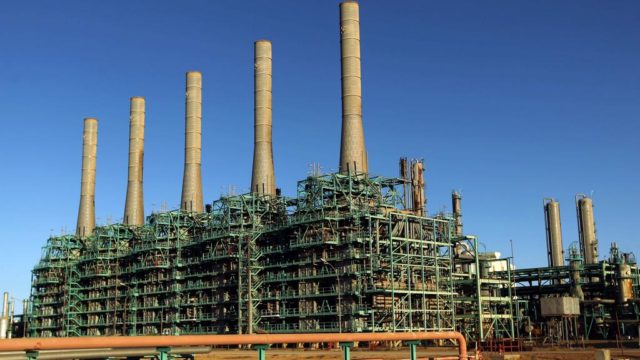
Briefs
Publication: Terrorism Monitor Volume: 16 Issue: 15
By:

Libya: Foreign Powers Keep Militias Well Supplied
Libyan General Khalifa Haftar handed back control of four key oil ports—Ras Lanuf, Es Sider, Zueitina and Hariga—to the National Oil Corporation (NOC) this month, ending a crisis that had seen the country’s crude production cut by 850,000 barrels per day (al-Jazeera, July 11). Although now resolved, the situation highlights once again how foreign interests are keeping Libya divided.
The oil standoff with Haftar came about after his Libyan National Army (LNA) recaptured Ras Lanuf and Es Sider from a rival militia in mid-June and attempted to funnel oil exports through the rouge “NOC East,” a breakaway part of the national oil company headquartered in Benghazi (Asharq al-Awsat, June 27).
The LNA chief’s climb-down appears to have come without concessions from the government in Tripoli. Some attribute it to a letter from U.S. President Donald Trump to Haftar’s backers in the House of Representatives in Tobruk, threatening legal action if the crisis went unresolved (Libya Observer, July 11). More likely it reflects the difficulties of exporting the oil, which under United Nations Security Council Resolution 2146 can only be done through the NOC.
This is one area where the UN has had some success. Security Council Resolutions banning the supply of arms and military equipment, on the other hand, are routinely flouted (Libya Herald, June 19, 2017). Just this month authorities at the port of al-Khums east of Tripoli seized a vessel that was allegedly delivering weapons from Qatar. The LNA announced it would investigate the suspected arms shipment, which was supposedly dressed up as a delivery of wheat (Asharq al-Awsat, July 11).
Haftar has his own strong backing from abroad—in particular the United Arab Emirates (UAE), along with Egypt and Saudi Arabia (Libya Herald, July 8, 2017). Plenty of evidence indicates that the UAE has violated the arms embargo on Libya to supply the LNA with weapons (Libya Observer, June 10, 2017; Daily Sabah, June 11, 2017). The suspicion is that the UAE intended to help Haftar export oil from the east as a way of funding his operation (Wall Street Journal, July 13; MEMO, July 16).
The move is another demonstration of how the split between Qatar and the Arab quartet of Saudi Arabia, the UAE, Bahrain and Egypt is filtering into conflicts around the region. Ibrahim Jadhran, whose forces were the ones to earlier briefly seize the oil ports from Haftar, is thought to be backed by Qatar. Although Jadhran insists he is loyal to Libya’s UN-backed Presidential Council, and that under his control the oil ports could remain open, the Presidential Council chairman, Fayez al-Sarraj, declared his forces illegitimate (Libya Observer, June 17).
Units from his Petroleum Facilities Guard (PFG)—which controlled the oil terminals between 2011 and 2016—have turned up in the Qatar-supported Benghazi Defense Brigade (BDB), which has been unable to shake its links to hardline Islamists (Libya Herald, March 3, 2017). Meanwhile, his brother, Osama Jadhran, is accused of passing PFG weaponry to Islamic State (Alwasat, June 19, 2017). The influence of foreign powers behind the scenes in Libya’s conflict remains as divisive as ever.
Yemen: Keeping the Country Divided
The killing of a politically connected Islamic preacher in the port city of Aden has sparked fears of a coordinated campaign of assassinations, and highlighted operational differences in the Saudi-led coalition now mired in the Yemen conflict.
Unidentified gunmen shot and killed Mohammed Ragheb on July 21 at a mosque in Aden’s Mualla neighborhood, according to local media reports (Aden al-Ghad, July 21). Ragheb was supposedly close to the Yemeni Congregation for Reform party, known as the al-Islah party, the Yemeni branch of the Muslim Brotherhood. His death follows a spate of similar killings that have targeted imams and al-Islah officials in Aden, and prompted worshipers to take greater security precautions (Aden al-Ghad, July 22).
Some rumors suggest that the United Arab Emirates (UAE) is behind the killings. Reports in Iranian media accuse the UAE of forming assassination committees in various Yemeni cities, including Aden, to target Houthis and high-ranking al-Islah party members (PressTV, June 26). The UAE has been accused by rights groups of running informal detention centers where abuses were rife (allegations Abu Dhabi rejects), while local militias it supports are accused of involvement in torture and enforced disappearances (New Arab, July 12; The National, July 8).
Al-Islah is allied with President Abdrabbuh Mansour Hadi, whose government (set up in Aden since coalition troops recaptured the city in 2015) the Saudi-led coalition forces are seeking to reinstate. The coalition appears not entirely united on this point. The UAE places less stock in Hadi and has a lower tolerance for al-Islah than does Saudi Arabia (see Terrorism Monitor, April 23). Part of the tension comes from the connection to the Muslim Brotherhood, to which the UAE is implacably opposed. Perhaps conscious of that, al-Islah has tried to distance itself from the group, saying it has “no organizational or political ties” to the Brotherhood (Gulf News, January 9).
The differing strategies and paucity of common purpose within the coalition saw fighters with the UAE-backed Southern Transitional Council (STC) take on Hadi loyalists in January (Arab News, January 28; al-Jazeera, January 28). Nonetheless, the UAE has proved its effectiveness on the ground, recapturing areas held by al-Qaeda in the Arabian Peninsula (AQAP), including the southern port of Mukalla in 2016, and steadily re-taking Shabwa and towns in Hadramawt province with the help of U.S. intelligence (The National, March 25).
The success of the UAE’s counter-terrorism operations in the south against AQAP and Islamic State, however, has involved training and arming thousands of tribal fighters, frequently empowering groups that share its hostility towards al-Islah. In the longer term, the move risks fostering instability and leaving the country even more divided.




